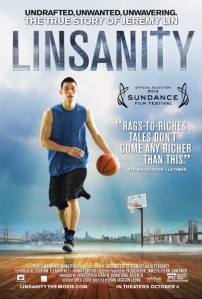Basketball superstar Jeremy Lin had a rise to fame that was the epitome of an underdog story.
Having set aspirations to become an athlete someday, Lin rarely winced when faced with challenges. He played basketball because he enjoyed it, planted reasonable expectations while cementing his priorities, and gained notoriety by naturally being a talented player.
Evan Jackson Leong’s uplifting doc doesn’t phonily paint Lin as such an upstanding individual. He simply comes off that way all while obtaining a deadpan presence.
Despite being more than qualified to be a lucrative addition to any team, many saw Jeremy Lin’s Asian-American background as a set back. According to Lin and interviewed observers, race still plays a big part regarding who gets chosen first when leaders are picking teams.
When race is focused on in Linsanity, it gives the viewer a look through Lin’s perspective. He may appear stonewalled and have developed an immunity to the disrespect over the years, but that disappointment from Lin, among others, rings throughout the doc. It’s an issue that’s not brushed aside quickly, and is actually touched upon later in the film as Leong focuses on the acquired media attention surrounding “Linsanity”.
It doesn’t feel like the filmmaker is beating a dead horse by revisiting race disputes. It can be argued that a couple of the examples Leong uses could’ve been misguided word choices by news anchors and lame attempts at humour from television writers, but the filmmaker’s point about lingering racism still vitally stands.
Another topic that is momentarily touched upon is religion. Jeremy is open about how he thinks a higher power helped him achieve goals and fight through rocky battles. Movie goers who think differently than Lin will have to bite their tongues during these genuine instances, but it’s not enough to drive any non-believers away.
Linsanity can often resemble an ESPN special presentation. It carries a kinetic pace and Leong loads his film with lots of in-game footage. That zest, however, is fitting given the subject matter. Could Linsanity play just as well on TV? Perhaps. But, Leong has also done a great job with providing a cinematic atmosphere to the biography. He realizes that this big guy (both figurative and literally) deserves a sizeable retelling, and it pays off.
It’s a film that doesn’t know how to start or end, however. Leong begins with a climactic point in Lin’s career and then takes us back through his story. Then, uneasy and unnecessary narration enters.
Hawaii Five-O’s Daniel Dae Kim has been brought on to lend his voice to guide viewers using Aaron Strongoni’s overworked writing. If Leong had ditched the corny narration along with passages that are supposed to add more inspiring gusto, the film wouldn’t have felt as if it were missing pieces. This doc doesn’t need Kim and Strongoni reminding movie goers just how incredible Lin’s story is.
The ending involves the film building up to a breaking point using Psy’s always energetic Gangnam Style set to various “Linsane” pop culture instances. Right as the film has set itself up to end on a high note, it keeps going. The additional information Leong offers is essential, but it shouldn’t feel tacked on after such an effective finisher.
What matters most though is the meaty middle that informs audiences about Jeremy Lin. It does so delightfully, and audiences walk away feeling elated and in awe.
Linsanity has the right stuff and deserves to be one of your top picks if you’re looking for something to check out this weekend.




Leave a comment